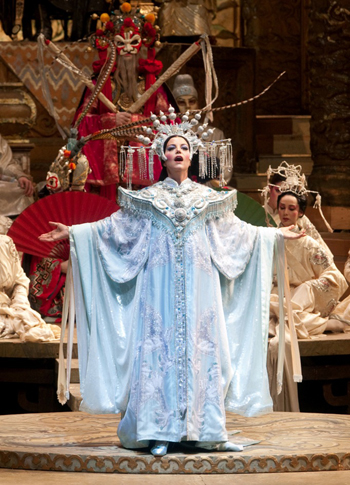
Love Is a Battlefield
Uncategorized January 14, 2013by Kathy Bryson, Mass Communications instructor and big AIDA fan
Opera has enjoyed a resurgence in recent years with live telecasts at local movie theaters as well as TV and radio productions. With the return of regular programming after the holidays, Great Performances at the Met on your local PBS station brings the good and bad of opera center stage once again.
In Turandot, The Metropolitan Opera explores domination in love. First performed in 1926, this incomplete masterpiece of Giacomo Puccini is loosely based on the legendary exploits of the real-life niece of Kublah Khan, Khutulun, but where the legendary princess challenged possible suitors for their horses, Princess Turandot has any suitor who can’t answer three questions executed. The big question of this opera then is: why would anyone date this woman?!
Turandot’s own ministers sing in charming irony about how they’re equally skilled in planning weddings and executions. The brilliant sets and costumes just emphasize the implausibility of the story. The dramatic questioning scene where Turandot first tests, then refuses Prince Calaf, takes place on a gold stage, filled with extras in white and gold. The grandeur of the Chinese court is clearly conveyed, but the caring ministers are dressed as Kabuki clowns. Turandot is shrouded in padded blue robes that might stand out on stage but do not convey the image of a compelling beauty.
It’s not surprising then that singer Maria Guleghina laughed, “There’s no love from the audience” when asked the challenge of this role. Well up to it, she and tenor Marco Berti exemplify the caliber of musical performance for which the Metropolitan Opera is know world-wide. That Hibla Gerzmava and James Morris, who play the supporting roles of the slave Liu and the father Timur, are also gifted performers only adds to the opera’s problems.
When Prince Calaf successfully answers Turandot’s three questions and is still refused, he counters with a question of his own – his name. Turandot threatens Liu, but she has already proven loyal to the prince by caring for his elderly father. She commits suicide to keep from revealing the answer under torture. In a truly poignant moment, Timur calls to Liu to wake up in the morning, not knowing she is dead. The audience also responds to Liu’s sacrifice, applauding noticeably more enthusiastically for Hibla Gerzmava than Maria Guleghina at the close.
Some critics feel the portrayal of Liu is more powerful than Turandot because Puccini pulled from life. He had a servant named Doria whom his wife accused of sexual misconduct until she killed herself. Others feel that Turandot never develops as a character because Puccini died before finishing the opera. Franco Alfano wrote the final duet where Turandot accepts Calaf after Liu’s death.
Either way, Turandot highlights the challenge of opera for many audiences. The music is wonderful, the staging highlights it beautifully, but the story is an awkward sell to a modern audience who probably doesn’t see marriage as quite the bloody competition Turandot did.
Up next in opera on TV – Donizetti explores the Elixr of Love, at the cinema – Mary Stuart loses her head, and locally, A Masked Ball with Florida Opera.
